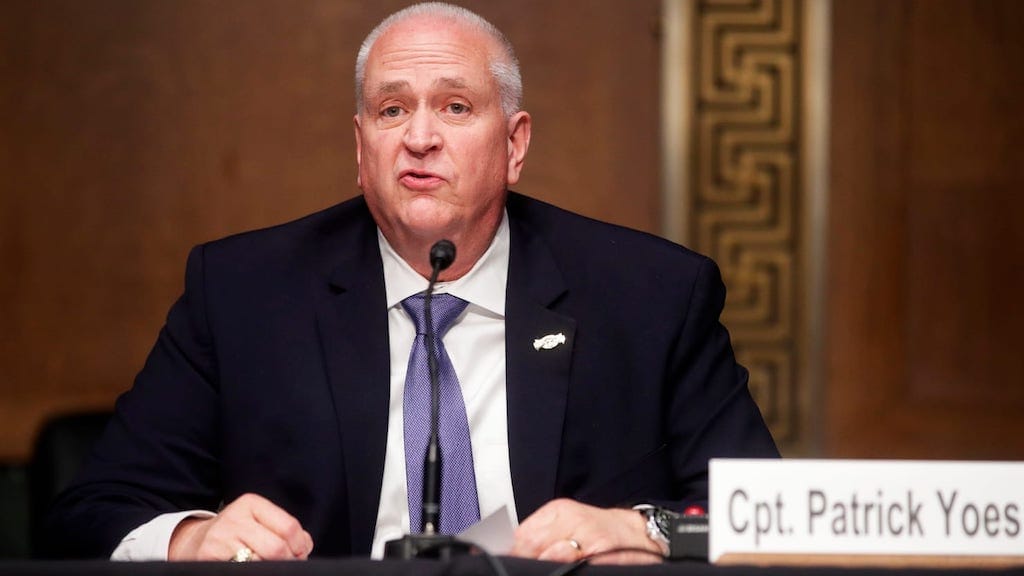Police Oppose Gigi Sohn, Instagram’s White Supremacist Content, FCC Interagency Group Staff
Fraternal Order of Police said they oppose Gigi Sohn’s nomination for FCC commissioner for her support of end-to-end encryption.
Justin Perkins

December 13, 2021 – The National Fraternal Order of Police (FOP) voiced its opposition to Gigi Sohn’s nomination to serve as commissioner on the Federal Communications Commission.
Citing “serious public safety considerations,” the law enforcement organization wrote Monday to the Senate Committee on Commerce, Science and Transportation Chairman Maria Cantwell, D-Washington, and Senator Roger Wicker, R-Mississippi, urging the committee to deny Sohn’s confirmation.
The FOP is concerned about Sohn’s advocacy for technology, such as end-to-end encryption –which is used by communications apps like Facebook’s WhatsApp – that law enforcement advocates say places barriers to investigating crimes.
“Specifically speaking, the FOP and many others in the law enforcement community at large are deeply troubled by the active and enthusiastic leadership role of Ms. Sohn as a board member for Electronic Frontier Foundation (EFF) in their forceful advocacy of end-to-end encryption and “user-only-access”—often referred to in the law enforcement world as “going dark,” the FOP said in a press statement.
“These new encryption methods for communications are causing Federal, State, and local law enforcement agencies to rapidly lose the capability to obtain information necessary to protect the public from crime and violence,” the FOP said in a press statement.
Referencing FBI Director Christopher Wray’s September U.S. House testimony, the FOP used an example of the FBI failing to access any information on the terrorist’s phone because of the service providers’ user only-access features.
“End-to-end encryption and “user-only access” that precludes lawful access to the content of communications in any situation creates a grave and potentially life-threatening risk,” the organization said.
Technology policy lawyer Berin Szoka, however, said on Twitter that the FCC “doesn’t have anything to do with encryption of Internet services,” and that end-to-end encryption is not only used to protect the privacy of Americans, but for their security and that of the nation.
FCC seeking nominations for interagency group
The Federal Communications Commission released a notice Friday seeking nominations for membership in its Telecommunications Interagency Working Group.
As mandated by the Infrastructure Investment and Jobs Act, the working group is being formed by the FCC chairwoman in partnership with the Secretary of Labor “to develop recommendations to address the workforce needs of the telecommunications industry.”
The chairwoman will choose four members of the working group from “outside organizations in various categories, including an industry association, a tribal organization, a rural telecommunications carrier, and a contractor firm.”
The working group will also include membership by public interest advocates for tower climber safety, a representative of a higher educational institution, an NTIA representative, and other agency appointees.
The group will, among other activities, “identify potential policies and programs that could encourage and improve coordination among federal agencies, between Federal agencies and States, and among States, on telecommunications workforce needs; identify ways in which existing Federal programs, including programs that help facilitate the employment of veterans and military personnel transitioning into civilian life, could be leveraged to help address the workforce needs of the telecommunications industry; and identify ways to improve recruitment in workforce development programs in the telecommunications industry,” the notice said.
The FCC seeks nominations by December 20, 2021 for membership on the working group.
Instagram hosting white supremacist content, ADL says
The Anti-Defamation League (ADL) issued a new report Thursday finding that extremist content remains easily accessible on Instagram.
ADL’s Center on Extremism (COE) researchers found accounts sharing white supremacist content simply by searching Instagram for terms related to the white supremacist and neo-Nazi movements despite measures by Instagram to reduce visibility of extremist content.
In August 2021, Instagram issued an update to add features for minimizing abuse. The company also reiterated a zero-tolerance policy for hate speech and abuse content, yet COE researchers could search hateful terms with hashtags, which has the potential to expose users to extremist posts from multiple accounts, it said.
COE researchers entered one extremist term and found five white supremacist accounts. They were quickly able to locate another 50 accounts sharing white supremacist content. By the third tier of followers, COE researchers located more than 200 public Instagram accounts that “branched out to other white supremacist themes, including traditionalism and white nationalism,” said ADL.
“The Instagram accounts found by COE researchers effectively serve as a springboard into accelerationist ideology, providing easy access and pathways to increasingly extremist content. Furthermore, after viewing these accounts and their networks, the COE account was targeted exclusively by ‘suggestions’ to follow white supremacist accounts, not limited to accelerationist content,” it said.









Member discussion